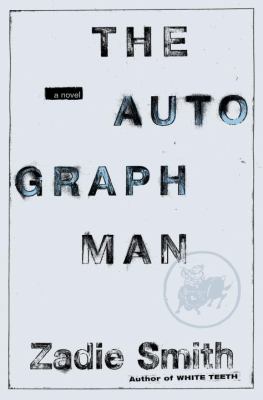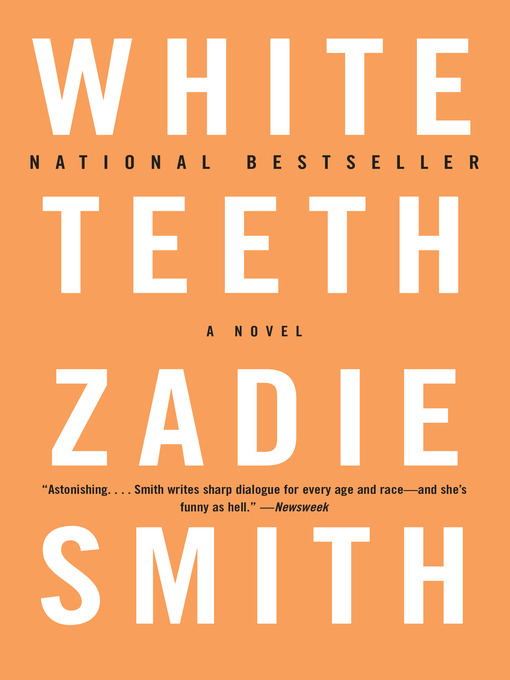At any given library, Zadie Smith is one of those authors who claims her own shelf, or two (And that’s just in the fiction section. You’ll find her essay collections in nonfiction, somewhere in the 800s). It’s hard to miss the Zadie Smith shelf, with its bulky hardbacks and bright colors. And if you’re like me, it’s hard to walk past her name once you’ve spotted it — a name you’ve seen referenced by your favorite authors; a name that seems to invoke the idea of contemporary literature itself. It was this feeling of promise, of cultural weight, that brought me to a halt at the end of the “Smith”s. I pulled “The Autograph Man,” a large white thing boasting a protagonist by the name of Alex Li-Tandem (A Chinese main character? What are the odds? I had to investigate). After a heartrending prologue, the story begins:
 ”You’re either for me or against me, thought Alex Li-Tandem, referring to the daylight and, more generally, to the day. He stretched flat and made two fists. He was fully determined to lie right here until he was given something to work with, something noble, something fine. He saw no purpose in leaving his bed for a day that was against him from the get-go. He had tried it before; no good could come from it. A moment later he was surprised to feel a flush of warm light dappled over him, filtered through a blind. Nonviolent light. This was encouraging.”
”You’re either for me or against me, thought Alex Li-Tandem, referring to the daylight and, more generally, to the day. He stretched flat and made two fists. He was fully determined to lie right here until he was given something to work with, something noble, something fine. He saw no purpose in leaving his bed for a day that was against him from the get-go. He had tried it before; no good could come from it. A moment later he was surprised to feel a flush of warm light dappled over him, filtered through a blind. Nonviolent light. This was encouraging.”
Recognizing that Zadie Smith had just described the emotional trajectory of most of my mornings, I decided “The Autograph Man” would be my next read. It is the delightful, damning story of Mr. Li-Tandem — lifelong resident of Mountjoy, a fictional London suburb, and the floundering son of a dead Chinese father and distant Jewish mother. Alex makes his living buying, selling, and occasionally faking autographs. He is a man of many obsessions, most of all the elusive former movie star Kitty Alexander. Also: alcohol, weed, women who are not his girlfriend, the difference between what is Jewish and what is not, the secret book he is writing on the aforementioned subject… and did I mention alcohol? It’s no wonder he is, at best, a subpar boyfriend to the sharp, beautiful Esther, who miraculously never sheds her fondness for him.
Esther is not alone in her astounding generosity. Through benders and bad decisions, Alex is reliably bailed out by his close group of childhood friends. James Wood, famous hater of Zadie Smith novels, would argue that Alex doesn’t deserve this goodwill, neither from his friends nor from the reader. “He is simply an absence,” Wood writes. “Those moments when Smith tries to squeeze a little sympathy on behalf of Alex always fail, because all one hears is the escaping sigh of unoccupied personhood.” Indeed, Alex can be a frustrating character, with his fuzzy values and weak instinct for survival. But he is big-hearted, and funny, and walks inside of a heavy grief left by the loss of his father. Naturally, there is an emptiness to him — and I would argue that this inner wound, along with the friends who love him anyway, are what make Alex’s story so affecting; so tender (Haven’t many of us, at one point or another, been afflicted with a feeling of “unoccupied personhood”? And haven’t we needed our friends?).
Wood doesn’t stop at criticizing Smith’s characters. His main attack is on her writing style, which he characterizes as frantic and overstuffed with information. In fact, it was Wood’s 2000 review of Smith’s debut novel, “White Teeth,” that coined the term “hysterical realism.” It declared “White Teeth” the latest example of this newly formed genre — a genre, Wood said, that “seems to want to abolish stillness, as if ashamed of silence… Stories and sub-stories sprout on every page, as these novels continually flourish their glamorous congestion.” I had mixed feelings reading Wood’s criticisms of Smith’s storytelling. On one hand, I can’t disagree with his description of the writing as busy and breathless, quick to indulge in a tangent, list, or metaphor. On the other hand, this very quality is what I fell in love with about Smith’s sentences — how alive they are; how they build, circle, and fold back in on themselves. Here’s a great passage from “White Teeth” about Clara, daughter of Hortense and lover of charmless men:
“Clara’s inexplicable dedication to Ryan Topps knew no bounds. It transcended his bad looks, tedious personality and unsightly personal habits. Essentially, it transcended Ryan, for whatever Hortense claimed, Clara was a teenage girl like any other; the object of her passion was only an accessory to the passion itself, a passion that through its long suppression was now asserting itself with volcanic necessity. Over the ensuing months Clara’s mind changed, Clara’s clothes changed, Clara’s walk changed, Clara’s soul changed. All over the world girls were calling this change Donny Osmond or Michael Jackson or the Bay City Rollers. Clara chose to call it Ryan Topps.”
Hortense claimed, Clara was a teenage girl like any other; the object of her passion was only an accessory to the passion itself, a passion that through its long suppression was now asserting itself with volcanic necessity. Over the ensuing months Clara’s mind changed, Clara’s clothes changed, Clara’s walk changed, Clara’s soul changed. All over the world girls were calling this change Donny Osmond or Michael Jackson or the Bay City Rollers. Clara chose to call it Ryan Topps.”
Clara is just one of a sprawling cast of characters. Somehow, Smith makes it impossible for the reader to forget a name or mix anyone up, even as she introduces generation after generation of two gnarled family trees: the Iqbal’s and the Jones’. Of these tribes, we meet Archie Jones and Samad Iqbal first — two friends who go all the way back to when they served together in the war. Weighed down with trauma, old ideas about masculinity and power, and one stunning secret, the two men stumble through their post-war lives with drama and hilarity, sabotaging themselves and others along the way.
Having first read “The Autograph Man,” I knew of Smith’s uncanny skill for writing male protagonists who inspire both pity and admiration, who are somewhat rotten yet worthy of our full attention. “White Teeth” more than delivers on this type of man, and even better, features several incredible, imperfect women with rich histories of their own. The friendship between Clara and Alsana, who have the mixed fortune of calling Archie and Samad their husbands, was a source of real delight and humor for me.
Should you ever find yourself at the Zadie Smith shelf, do not hesitate to enter — there’s no wrong choice; only a multitude of portals to vibrant worlds where people hurt and heal each other, history repeats itself, and the truth always comes to light.
I will leave you with an excerpt from “This is how it feels to me,” Smith’s candid response to Wood’s criticism of her “hysterical” stories:
“When I was 21 I wanted to write like Kafka. But, unfortunately for me, I wrote like a script editor for The Simpsons who’d briefly joined a religious cult and then discovered Foucault. Such is life.”


